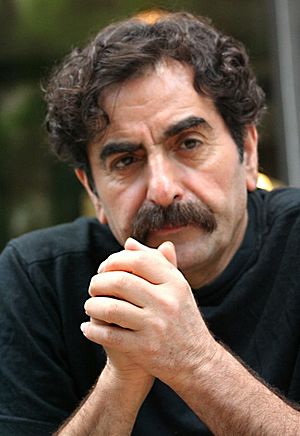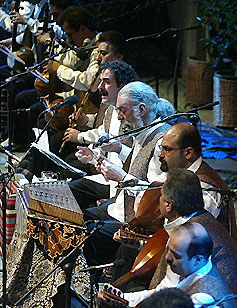Shahram Nazeri facts for kids
Quick facts for kids
Shahram Nazeri
|
|
|---|---|
 |
|
| Background information | |
| Born | 18 February 1950 Kermanshah, Iran |
| Genres | Kurdish music, Persian music |
| Occupation(s) | Singer, Composer |
| Instruments | Setaar |
| Years active | 1958–present |
Shahram Nazeri was born on February 18, 1950, in Kermanshah, Iran. He is a famous Iranian singer with Kurdish roots. He sings Sufi music, which is spiritual music, along with traditional Kurdish and Persian songs.
Shahram Nazeri has worked with many great Iranian musicians. These include Jalil Shahnaz, Hossein Alizadeh, Jalal Zolfonoun, Parviz Meshkatian, and Faramarz Payvar. He also often performs with his son, Hafez Nazeri, who is a talented composer.
Nazeri was the first musician to use poems by Rumi in Persian music. Rumi was a famous poet. This helped create a new style of Sufi music in both Persian classical and Kurdish music.
Contents
Shahram Nazeri's Musical Journey
Shahram Nazeri became a well-known artist in Iran in the 1970s. His first albums were released in the late 1970s. These early songs often spoke about freedom and love for his country.
Nazeri has released more than forty albums during his career. His 1984 album, The One Hundred-Petalled Rose (also known as Gol-e Sadbarg), became very popular. It holds the record for the best-selling album of Persian classical and Sufi music ever.
Early Life and Training
Shahram Nazeri's musical talent was noticed when he was very young. His mother helped him develop his skills. As a child, he learned from famous Persian music teachers like Abdollah Davami and Nourali Boroumand.
When he was just eleven years old, he performed live on national Iranian television for the first time. By the time he was 29, he had many fans who loved his music.
Performances Around the World
Shahram Nazeri has continued to perform in Iran and in many other countries. He has sung at big events and famous places worldwide. These include the Festival of Avignon in France and the Tokyo Summer Festival in Japan.
In 2014, during a concert in his hometown of Kermanshah, he sang a Kurdish song. The song had lyrics that meant, "I am from Kermanshah, I don’t speak Persian." This caused some discussion and criticism from authorities in Iran.
In 2019, he decided to cancel his yearly concert in Konya, Turkey. He did this to show support for people affected by a conflict in Syria. He explained that Rumi's message is about peace and friendship, and he wanted to respect that. He has not performed in Turkey since then.
Awards and Recognition
Shahram Nazeri has received many important awards for his music.
- In 2007, he received the Chevalier des Arts et Lettres from France. This award recognizes important artists.
- Also in 2007, the Asia Society gave him the Lifetime Cultural Heritage Award. This award honors people who have made a lasting impact on culture.
- He also received the Simorgh award in 2007 from an international group that promotes understanding between cultures.
- In 2015, he won the Hafez Film Award for Best Original Song.
Images for kids
See also
- Aref Ensemble
- Dastan Ensemble
- The Kamkars
- Shams Ensemble
 | Stephanie Wilson |
 | Charles Bolden |
 | Ronald McNair |
 | Frederick D. Gregory |













